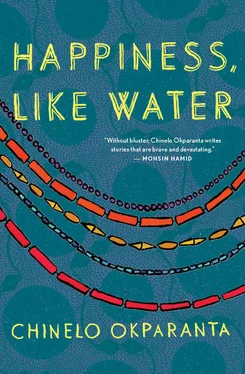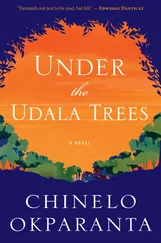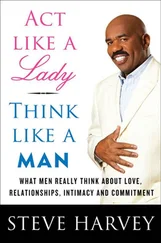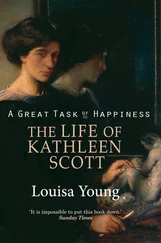We go back and forth. I tell her she’s wrong. I’m sure he doesn’t know any better. She tells me that cancer is no joke, that it’s like looking death straight in the eyes.
‘Believe me,’ she says, ‘I know what things have been like in the past. But this time is different. He knows better for sure.’
I’m sitting on the floor of my apartment, drawing circles with my fingers on the beige carpet, leaning my head on the seat of my sofa. There is a pile of papers — essays — by my side. I should be grading them, filling their margins with marks, inserting carets, striking through words. Instead I’m listening to Mama’s voice on the phone, drawing circles on the carpet and staring out my open balcony door.
Outside, the sky is greying, and the sun looks like a fuzzy, deep-orange ball in the clouds. I look down at the carpet with the circles that I’ve drawn. There is a dark spot in the middle of one of the loops, and for whatever reason, maybe because I am talking with her on the phone, or maybe because we’re talking about Papa, I see her face in that area of the carpet, and I see the dark spot above her left cheekbone. It reminds me of the picture on her Massachusetts driver’s licence, in which she’s sporting the remains of a black eye.
When I think of Massachusetts, I think of overfed cockroaches and mice, inflated and brown, brazen and indiscreet, not like the ones in Port Harcourt. They were the first things we met in our apartment on Comm Ave. Even now in my apartment in Pennsylvania, three or so hundred miles away, sometimes I can almost hear the scurrying of the mice, the sounds that their little feet made as they scampered about the tattered linoleum of that tired, old kitchen in Boston.
When I think of Massachusetts, I think also of that cold and windy November day, the day we came, Mama and I, in our matching cotton dresses, Papa in his finest isiagu, patterned with gold lion heads embroidered on the main fabric.
Even the heavier fabric of the isiagu did not do much to protect him from the cold. It did only a little more than the cotton of our dresses did for us.
But mostly, when I think of Massachusetts, I remember the period when Mama went on that trip to Florida, just a few months after we arrived.
Someone, another international student in Papa’s engineering programme, tells Papa and Mama about a church group that’s offering to help us get working papers and possibly even help us become legal permanent residents. During the day, Papa attends classes at Boston University. During the nights, he works as the superintendent of the building where we live. In exchange for free housing in the basement apartment and some pocket change, he sweeps floors and takes out trash from the lounges. He answers the calls of the residents. If they are locked out of their apartments, he opens the doors. If a light bulb is broken, he replaces it. It is a 24/7 job, and combined with his classes, he has no choice but to stay back. Mama heads off to Florida on her own.
Those days, we get our food from the food bank at the church on Beacon Street. Mama makes sure to get the supplies before she leaves. Two boxes of cornflakes, a box of cherry-flavoured Fruit Roll-Ups, a loaf of bread, tomatoes, onions and a bag of rice. From Christie’s Market, she buys some oranges and bananas, and a carton of milk, because there are no oranges or bananas or milk at the food bank. She buys a crate of eggs, because the eggs at the bank are always several weeks expired. I am seven, almost eight years old, and the day Mama leaves for Florida, she wakes me up early to say goodbye. ‘Be good,’ she says. ‘Take care of your father.’ I nod, though I’m not sure what that will mean.
That evening, Papa returns from school or work, I don’t know which.
‘Papa, welcome,’ I say, like I always do, when he enters the apartment. I am in the kitchen, rummaging in the fridge for something to eat.
‘You’re hungry?’ he asks. His voice is serious.
I close the fridge and look at him. I nod.
‘Okay,’ he says. ‘Okay.’ He puts down the bag that is hanging from his shoulder, runs his hand back and forth over his head. ‘You can go watch television in the living room. I’ll get something ready for us.’
From the living room, I hear metal clanging on metal. I hear whisking in a bowl. When Papa calls me to eat, there is a small tray of toasted bread, a stick of butter on a white saucer, and a plate of something in between scrambled eggs and an omelette, tomato and onion cubes scattered evenly, jagged and protruding, like raised scars across the top.
We eat together that evening, and even if the omelette is runny and bland, and even if the toast is charred on one side, I eat them all as if I’m eating one of Mama’s dishes — her rice and beans or her beef stew or her okra soup. I lick my lips and tell him thank you when I’m done. I clear the table, and he helps me. I tuck that evening away in my memory, safely, so that I do not forget it, because I am seven, almost eight years old, and it is the first time that I am seeing this side of him.
A couple of days later, Mama returns from Florida. She doesn’t get the working papers. It even turns out that the church organization might be a scam. I’m sitting in my room when I hear her tell this to Papa. He grunts and tells her to hush. How would she know a scam from real, he asks. She says she knows. He tells her to hush again. ‘This is what happens when you send a woman to take care of business,’ he says. ‘An utter disaster,’ he says.
I come out of my room when he has gone into theirs. Her luggage is on the living-room floor. She smiles at me when she sees me, pats me on the shoulder, asks me if I’m hungry. ‘Yes,’ I say. ‘Very hungry,’ and it’s the truth. It is late evening by then, and, knowing that Mama would be returning that day, Papa did not prepare anything for dinner.
Mama nods and tells me she’ll go get some groceries straight away, from the African store off Beacon Street, not too far from where we live. Today is a celebration that calls for Nigerian food, she says, because for now it seems we have no choice but to remain Nigerians. ‘Might as well make it a celebration,’ she says. ‘No need to lament who we are.’ I watch her walk towards the door, and I make a motion to follow, even if I don’t have my shoes on. ‘Stay,’ she says. ‘I’ll be back before long.’ I lean on the door and watch her walk away. My stomach is growling, but all I can do is watch. When she turns the corner — when I can’t see her any more — I shut the door and fasten the latch.
She comes back before long, like she says. She cooks up the meal, whistling and humming the whole time. Then she dishes out some of the food for Papa, a tray of egusi soup, which she makes from the fresh egusi seeds that she gets from the Nigerian store. On the tray there is also a round ball of garri. She takes the tray to Papa in his room, still whistling and smiling and bopping her head just a bit, even as she enters the room. It is silent for a while and then I hear his voice. I don’t hear her voice, and meanwhile I’m thinking how I wish she’d hurry up in there, because hunger is about to kill me. Then something in me suddenly becomes afraid. I go to my room and wait. His voice grows louder, scolding, and there is a loud smacking sound. And still she does not come out. And still, his scolding voice.
At first I want to run out to her, but I am too afraid. But then even the fear becomes too much to bear, and so I come out of my room again, make my way to the kitchen, inch closer and closer to their bedroom. On the wall dividing their bedroom from the living room is a black shelf. I am hiding to the side of the shelf, crouched down on my knees, when I see Mama come out of the room with the tray. She goes back into the kitchen, shaking her head from side to side. She fusses with the pots and pans and then she heads back to his room with another tray of food.
Читать дальше












